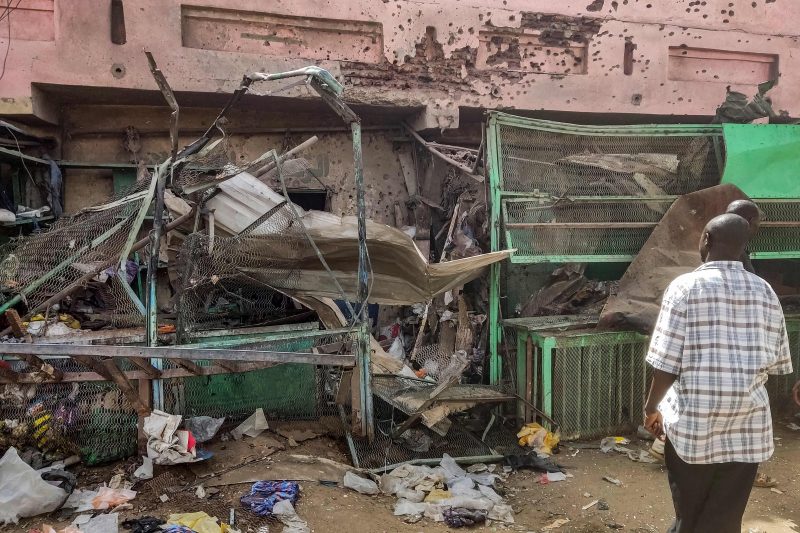The United States is levying economic sanctions against warring military forces in Sudan as a consequence for ongoing fighting in the northeast African country that has violated multiple cease-fire agreements.
In addition to the sanctions, the White House said Thursday that it would also impose visa restrictions “against actors who are perpetuating the violence” in Sudan, where fighting between the Sudanese armed forces and the Rapid Support Forces paramilitary broke out in April.
“These measures are intended to hold accountable those responsible for undermining the peace, security, and stability of Sudan,” national security adviser Jake Sullivan said in a statement.
According to the Treasury Department, the United States is imposing sanctions on four companies that U.S. officials said are generating revenue from the conflict in Sudan: Al Junaid Multi Activities and Tradive General Trading, which are associated with the RSF; and Defense Industries System and Sudan Master Technology, which are associated with the Sudanese armed forces.
“Through sanctions, we are cutting off key financial flows to both the Rapid Support Forces and the Sudanese Armed Forces, depriving them of resources needed to pay soldiers, rearm, resupply, and wage war in Sudan,” Treasury Secretary Janet L. Yellen said in a statement. “The United States stands on the side of civilians against those who perpetuate violence toward the people of Sudan.”
Hundreds of thousands of people have been displaced and hundreds of civilians killed since the violence began April 15 — when a rivalry between Gen. Abdel Fattah al-Burhan, the military chief and de facto head of state, and Gen. Mohamed Hamdan Dagalo, known as Hemedti, who heads the RSF paramilitary, exploded into open conflict.
Though the United States and Saudi Arabia helped broker a week-long cease-fire in late May, fighting has continued in Sudan, hindering the delivery of humanitarian assistance and hurting the civilians who need aid the most, Sullivan said. The Sudanese army said Wednesday that it was suspending peace talks with the RSF, days before the latest cease-fire extension is set to expire.
“The scope and scale of the bloodshed in Khartoum and Darfur, in particular, is appalling,” Sullivan said. “And, the failure of the Sudanese Armed Forces and Rapid Support Forces to abide by the cease-fire only further deepens our concern that the people of Sudan will once again face a protracted conflict and widespread suffering at the hands of the security forces.”
President Biden issued an executive order on May 4 expanding U.S. authorities’ ability to respond to the violence in Sudan and help end the conflict, including the levying of sanctions “on certain persons destabilizing Sudan and undermining the goal of a democratic transition.”
The sanctions announced Thursday are an indication that the United States is following through with those threatened consequences, Sullivan said.
“The Sudanese people did not ask for this war. The United States will continue to stand with them,” Sullivan said. “We will continue to support their rightful demand for a transition to democracy. And working with our partners, we will continue to hold the belligerent parties accountable for their unconscionable violence and defiance of the will of the people.”
The fighting broke out in April weeks ahead of a deadline for the Sudanese military and RSF to agree on an internationally backed power-sharing agreement. The two rivals joined forces in a coup in 2021, ousting Sudan’s prime minister who was elected in the wake of the 2019 revolution.
Weeks later, millions of Sudanese remain without access to clean water, electricity, food, health care or any way to safely move around the country.
“A cease-fire in Sudan is critically important to providing humanitarian aid,” said Steve Taravella, senior spokesperson at the U.N. World Food Program. “Aid workers cannot assist those who need help unless our own staff can be safe to provide that help. The situation right now is very precarious.”
Since restarting operations in early May, WFP has provided 670,00 people with emergency food assistance in 13 of Sudan’s 18 states, Taravella said. Over the weekend, with the shelling and gunfire reduced, WFP was able to distribute aid to previously inaccessible parts of Khartoum, among other areas, he said.
But even with the U.S.- and Saudi-brokered cease-fire, sporadic fighting and violence have continued. On Thursday, Taravella said, a warehouse storing food for 4.4 million people was looted in el-Obeid, the capital of the North Kordofan state. Taravella said it remained unclear who was behind the attack and how much was taken.
The latest cease-fire — the seventh since the war began — is set to expire Saturday.
“We are assessing the situation day by day,” Taravella said.
Siobhan O’Grady contributed to this report.








